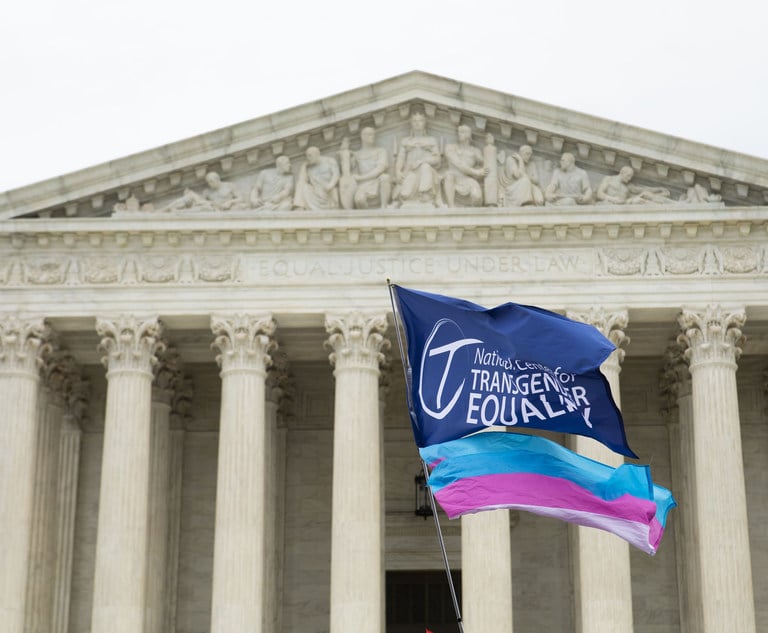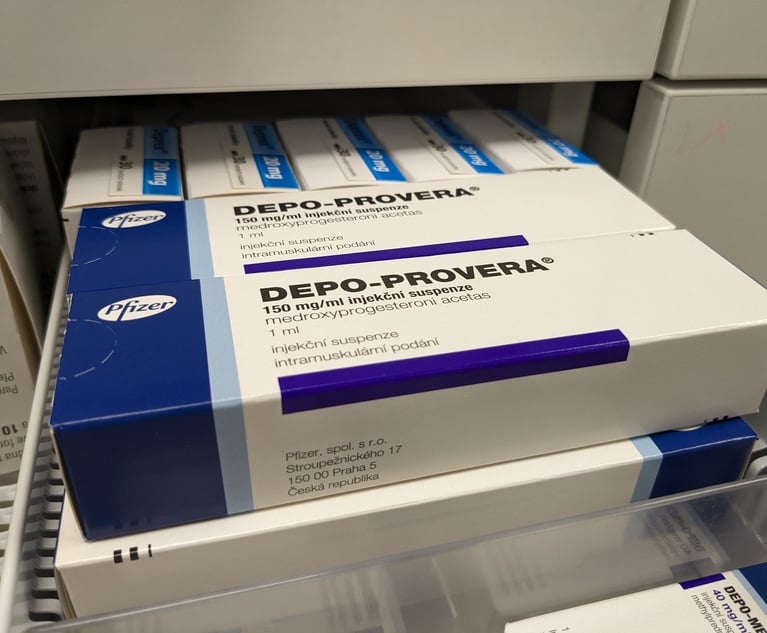Ninth Circuit Cannabis Ruling Gives Biz Owner New Chance to Fight Charges
A new Ninth Circuit ruling confronts the clash between federal and state marijuana laws. "If [Charles] Lynch was not compliant with state law, he is not covered by the rider and is subject to the penalties of his conviction," the Ninth Circuit said.
September 13, 2018 at 02:55 PM
4 minute read
The U.S. Court of Appeals for the Ninth Circuit on Thursday breathed new life into the defense of former Morro Bay marijuana dispensary owner Charles Lynch, sending his case back to a trial court to determine if his business was operating legally under California law before he was prosecuted and convicted on drug charges.
That compliance finding will be key. If a judge decides Lynch's Central Coast Compassionate Caregivers was operating legally under state laws, his prosecution could be hampered by a federal appropriations rider that bars federal prosecutors from spending tax money pursuing state-legal medical marijuana operations.
“If Lynch was not compliant with state law, he is not covered by the rider and is subject to the penalties of his conviction,” wrote Judge John Rogers of the Sixth Circuit, who was sitting by designation. “Should the district court resolve the state-law-compliance issue in Lynch's favor, the court may then rule in the first instance on the legal issues that such a determination would raise.”
The 2-1 ruling was by no means a complete victory for Lynch. Rogers and Ninth Circuit Judge Jay Bybee affirmed Lynch's conviction and rejected his arguments that U.S. District Judge George Wu of the Central District of California improperly barred potentially exculpatory evidence from his trial. The panel also found that Lynch should be sentenced to a five-year mandatory minimum prison term if his conviction stands on remand. Wu had sentenced Lynch to one year.
In dissent, Judge Paul Watford said Wu went too far in warning jurors not to engage in jury nullification. Watford said the case should have been remanded to the district court for a new trial.
“At least in cases like this one, where nullification was an obvious possibility given the popularity of medical marijuana in California, I don't see how the government could ever prove that a court's unduly coercive anti-nullification instruction had no effect on the outcome,” Watford wrote.
The majority opinion marks the latest twist in the prosecution of Lynch, who has become an icon in the medical marijuana industry and a symbol of the state-federal tension over legal marijuana. Lynch opened Compassionate Caregivers in 2006—he says he was officially welcomed by the Morro Bay Chamber of Commerce—and obtained a conditional use permit from the city that year to add a plant nursery to the dispensary site.
In March 2007, deputy sheriffs and agents from the U.S. Drug Enforcement Administration served search warrants at the dispensary and Lynch's home. Compassionate Caregivers closed in May 2007 and two months later Lynch was arrested and charged with five federal counts related to marijuana distribution and sales to minors.
Lynch's legal plight attracted national media attention and support from two California congressmen who were among the earliest supporters of the original federal appropriations rider, Democrat Sam Farr—now retired from Congress—and Republican Dana Rohrabacher. State Senate Democrats also submitted a friend-of-the-court brief backing Lynch.
California voters approved medical marijuana use in 1996 through the Compassionate Use Act. Seven years later, the state enacted the Medical Marijuana Protection Act, creating a user-identification card system. Federal agencies continued to crack down on sellers and users, however, for violations of federal drug laws.
The ruling in United States v. Lynch is posted below:
Read more:
Get the latest cannabis lawyering, compliance and commentary straight to your inbox with Higher Law, a new Law.com briefing. Learn more and sign up here.
This content has been archived. It is available through our partners, LexisNexis® and Bloomberg Law.
To view this content, please continue to their sites.
Not a Lexis Subscriber?
Subscribe Now
Not a Bloomberg Law Subscriber?
Subscribe Now
NOT FOR REPRINT
© 2024 ALM Global, LLC, All Rights Reserved. Request academic re-use from www.copyright.com. All other uses, submit a request to [email protected]. For more information visit Asset & Logo Licensing.
You Might Like
View All
New Class Action Points to Fears Over Privacy, Abortions and Fertility

Deception or Coercion? California Supreme Court Grants Review in Jailhouse Confession Case
5 minute read
Court rejects request to sideline San Jose State volleyball player on grounds she’s transgender
4 minute readTrending Stories
Who Got The Work
Michael G. Bongiorno, Andrew Scott Dulberg and Elizabeth E. Driscoll from Wilmer Cutler Pickering Hale and Dorr have stepped in to represent Symbotic Inc., an A.I.-enabled technology platform that focuses on increasing supply chain efficiency, and other defendants in a pending shareholder derivative lawsuit. The case, filed Oct. 2 in Massachusetts District Court by the Brown Law Firm on behalf of Stephen Austen, accuses certain officers and directors of misleading investors in regard to Symbotic's potential for margin growth by failing to disclose that the company was not equipped to timely deploy its systems or manage expenses through project delays. The case, assigned to U.S. District Judge Nathaniel M. Gorton, is 1:24-cv-12522, Austen v. Cohen et al.
Who Got The Work
Edmund Polubinski and Marie Killmond of Davis Polk & Wardwell have entered appearances for data platform software development company MongoDB and other defendants in a pending shareholder derivative lawsuit. The action, filed Oct. 7 in New York Southern District Court by the Brown Law Firm, accuses the company's directors and/or officers of falsely expressing confidence in the company’s restructuring of its sales incentive plan and downplaying the severity of decreases in its upfront commitments. The case is 1:24-cv-07594, Roy v. Ittycheria et al.
Who Got The Work
Amy O. Bruchs and Kurt F. Ellison of Michael Best & Friedrich have entered appearances for Epic Systems Corp. in a pending employment discrimination lawsuit. The suit was filed Sept. 7 in Wisconsin Western District Court by Levine Eisberner LLC and Siri & Glimstad on behalf of a project manager who claims that he was wrongfully terminated after applying for a religious exemption to the defendant's COVID-19 vaccine mandate. The case, assigned to U.S. Magistrate Judge Anita Marie Boor, is 3:24-cv-00630, Secker, Nathan v. Epic Systems Corporation.
Who Got The Work
David X. Sullivan, Thomas J. Finn and Gregory A. Hall from McCarter & English have entered appearances for Sunrun Installation Services in a pending civil rights lawsuit. The complaint was filed Sept. 4 in Connecticut District Court by attorney Robert M. Berke on behalf of former employee George Edward Steins, who was arrested and charged with employing an unregistered home improvement salesperson. The complaint alleges that had Sunrun informed the Connecticut Department of Consumer Protection that the plaintiff's employment had ended in 2017 and that he no longer held Sunrun's home improvement contractor license, he would not have been hit with charges, which were dismissed in May 2024. The case, assigned to U.S. District Judge Jeffrey A. Meyer, is 3:24-cv-01423, Steins v. Sunrun, Inc. et al.
Who Got The Work
Greenberg Traurig shareholder Joshua L. Raskin has entered an appearance for boohoo.com UK Ltd. in a pending patent infringement lawsuit. The suit, filed Sept. 3 in Texas Eastern District Court by Rozier Hardt McDonough on behalf of Alto Dynamics, asserts five patents related to an online shopping platform. The case, assigned to U.S. District Judge Rodney Gilstrap, is 2:24-cv-00719, Alto Dynamics, LLC v. boohoo.com UK Limited.
Featured Firms
Law Offices of Gary Martin Hays & Associates, P.C.
(470) 294-1674
Law Offices of Mark E. Salomone
(857) 444-6468
Smith & Hassler
(713) 739-1250







